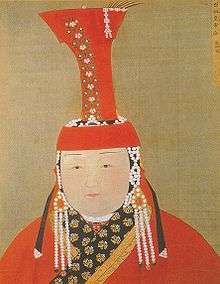Chabi
Empress Chabi (1225[1]–1281) was a Khongirad empress consort of the Yuan dynasty in China, married to Kublai Khan. As such, she was the wife to the Mongol Khagan who had conquered all of China in the 1270s.
| Empress Chabi | |||||
|---|---|---|---|---|---|
 | |||||
| Predecessor | Empress Quan Tegulen | ||||
| Successor | Empress Nambui | ||||
| Born | 1225 | ||||
| Died | 20 March 1281 (aged 56) | ||||
| Spouse | Kublai Khan | ||||
| Issue | Zhenjin, Crown Prince Mingxiao | ||||
| |||||
| Father | Anchen of the Onggirat tribe | ||||
| Religion | Nestorian Christianity, previously Buddhism | ||||
Life
According to "The Secret History of the Mongols", Chabi was the favorite wife of Kublai and a valued unofficial adviser throughout his reign. She was a patron of the arts and may have played a key role in advancing the interests of the young Venetian traveler, Marco Polo. It is said she was Christian, like her mother-in-law, Sorghaghtani, although Sorghaghtani was also said to be the niece of Chinngis Khan.
Empress Chabi exemplified the high role of women in Mongol culture. As Kublai's wife and advisor, she knew Kublai very well. She was an important political and diplomatic influence, especially in pleasing the Chinese masses through reconciliation. Chabi promoted Buddhism in the high levels of government. She suggested the better treatment of the north Chinese imperial family in order to appease the people. Chabi also helped Kublai prevent the conversion of Chinese cultivating land into Mongol pastures, out of respect to the Chinese people. Chabi and Kublai's combined cosmopolitan views were effective at adopting Chinese culture without being overwhelmed by it. Chabi converted to Nestorian Christianity under the influence of her mother-in-law, Sorgaghtani Beki and after Chabi's conversion, Nestorianism was fast spread around China . With Chabi's help, Kublai was not able to control his ambitious brother and the potentially unruly Chinese scholar-gentry and peasantry.
Sources
- Stearns, Peter N.; Michael Adas; Stuart B. Schwartz; Marc Jason Gilbert (2011). "14 • The Last Great Nomadic Challenges: From Chinggis Khan to Timur". World Civilizations: The Global Experience AP* Edition (6th ed.). pp. 327–328. ISBN 0-13-136020-5.
- Jack Weatherford (2011). The Secret History of the Mongol Queens: How the Daughters of Genghis Khan Rescued His Empire Paperback. Broadway Books. ISBN 0307407160.
- "MONGOLS, CHRISTIANITY, NESTORIANS AND THE SILK ROAD". factsanddetails.com.
References
- Biographical Dictionary of Chinese Women, Volume II:Tang Through Ming 618-1644: "Chabui, c. 1225-1281 (Mongol and Yuan dynasties). Was the most senior, although not the first, wife of Quibilai Khan (1215-1294)"
| Preceded by Tegulen |
Consort of Kublai Khan 1260–1281 |
Succeeded by Nambui |
| Preceded by Chubei |
Khatun of the Mongols 1260–1281 | |
| Preceded by Empress Quan (Song dynasty) |
Empress of Yuan 1274–1281 |